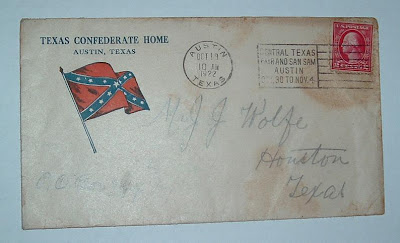
I recently purchased a musty old book at an antique store in a small Texas town: Civics: Texas and Federal, by Triplett and Hauslein; Rein & Sons, Houston (1912). I bought it for an old document left between the pages long ago. It had more value to me than the neglected book that had archived it all these years. I had just about tossed it into the donation pile when I decided to thumb through its pages quickly for any interesting old photographs. I was rewarded for my efforts. Many historical images from around the state of Texas began to appear, but one in particular caught my eye--the Home for Confederate Veterans in Austin.

Earlier this year, I had acquired a letter written in 1922 by an old Civil War soldier--a veteran of the Confederacy living in Austin, Texas at the Home for Confederate Veterans. The envelope bore the Confederate insignia flag and address of the home. The letter was addressed to a Mr. Wolfe of Houston, a bookseller I presume, whom the old vet thought might be able to help him escape his "prison" (he states he is an "inmate of the Home") via the pages of a book about his homeland--Davidson County, Tennessee.

It's a poignant letter from an old man at the end of his life, longing to see his boyhood home. His life long ago shaped by the events of the War Between the States, he still seems to retain an important sense of place for his younger years in Tennessee. By the time he finds himself in the Confederate Home in Austin, Texas, and writing this letter at age 84, his financial situation is pretty dire, but a creative spark hatches a scheme whereby he can travel home again through the pages of a book.
John L. Young is the Confederate veteran. His brief bio is found here at the Texas State Cemetery site. From it, we learn Mr. Young's age, that he was from Nashville, and that he was listed as a deserter during the war. Apparently, he signed up for 12 months and was taken prisoner, but was released after he'd been in service for 12 months, so he just went home. Assuming his obligation was over, and presumably having no more use for the war, he tried to get on with his life. But it would never be the same, and you can hear echoes of longing for his pre-war youth in the lines of his simple request:
I wish to know if I can rent your book for one month. I propose to pay expressage both ways and promise and pledge to keep it absolutely clean and free from abuse. This will be a great favor to me. I will promise that no hands shall touch it but mine.

Every time I read this letter, I wonder how Mr. Wolfe in Houston responded to the old man. Or did he bother to respond at all? Did Mr. Young get to read about his old homeland and see images that would enhance time travel back home through his aging memories? What would a bookseller today do with such a request from, say, a World War II vet? Unless it was a collectible book of great value, I'm pretty sure I would send the old man the book with my compliments and tell him to enjoy it.
Hello,
ReplyDeleteI am a fan of your blog, but this one it the best yet.
Thank you for the inspiration.
Nancy
Houston, TX
Thank you, Nancy! I appreciate the kind words. I'm just now seeing your comment for some reason. This is one of my favorites, too, and hopefully I can add to it one day with more information about the bookseller or even the book the old Confederate wanted desperately to read. Whether he got to read it will forever remain a mystery, I'm afraid. There's a good short story fermenting here...
ReplyDelete